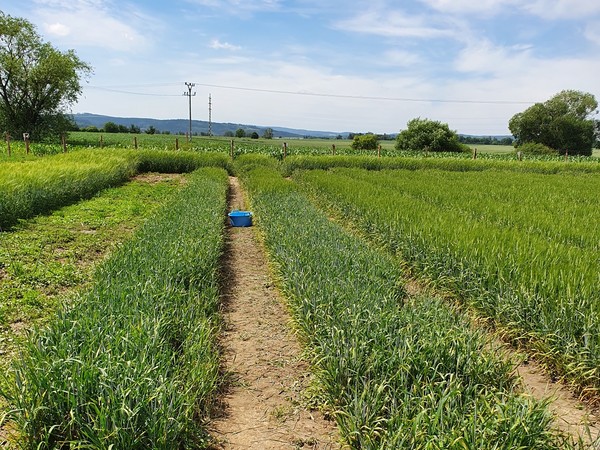Czech scientists have joined their international colleagues in calling on the European Parliament and the European Commission to change legislation regarding the use of modern methods of plant genome editing, which will free them to carry out research to benefit agriculture, the economy, and society as a whole. They published their Open Statement exactly one year after the European Court of Justice (ECJ) decided that plants bred by these methods fall into the category of genetically-modified organisms (GMOs). Ivo Frébort, Director of UP’s Centre for the Region Haná (CRH), and Jaroslav Doležel, CRH’s scientific director, both joined the appeal.
According to the signatories, the ECJ decision means that crops with slightly improved genomes, which can also occur spontaneously in nature, fall under restrictive European regulations which forbid these improvements in practice. Leading biologists and scientists disagree with this ruling and voiced their opposition to the possible negative impacts of it one year ago. The text of their statement is available here.
Representatives of the leadership at CHR, which unites teams of the UP Faculty of Science, the Institute of Experimental Botany of the Czech Academy of Sciences, and the Crop Research Institute, have joined in. In reaction to the decision by the European Court of Justice, they called last December on the Czech prime minister and other politicians to push through changes in EU legislation in this area.
According to professors Frébort and Doležel, there are fears that the existing situation could permanently damage EU countries: “While throughout the world there are more and more countries allowing this modern technology, Europe remains rigid. Each month the gap between EU countries and progressive countries widens, which can have very negative impacts on European agriculture, production, food quality, and also on the environment.”
EU Legal regulations on GMOs do not reflect the current state of scientific knowledge, according to the experts. Plants which have undergone simple and targeted genome improvements through the help of precise CRISPR breeding and which do not contain foreign genes are just as safe as if they were obtained from classic breeding techniques. The scientists are calling on European authorities to react quickly and amend the legal regulations so that the use of these methods does not fall under mandates on GMOs. CRISPR has huge potential in the area of research and innovations, and last but not least, it can help in confronting acute challenges, especially in conjunction with climatic changes.
The main initiator of the European initiative is Dirk Inzé, Scientific Director of the VIB-UGhent Department of Plant Systems Biology. “This is one of the rare examples in which the scientific community across the entire EU has united and unanimously calls for a revision of the European legislation affecting genome editing. The initiative is supported by 121 leading European institutions, and currently, this topic is a buzzword for politicians at the European, as well as national levels. Our endeavour is supported by most of the agricultural ministries across EU countries. It is necessary to move to the level of the European Parliament now.”
His words were also supported by Czech Minister of Agriculture Miroslav Toman. “In general, the Czech Republic supports these new methods, provided that the findings of plant and animal breeding shall not be subjected to patents. The reason for this is to protect new Czech small and middle breeding companies, as well as the breeders, so that they are able to continue using breeding material during the creation of new plant varieties,” the minister said.
In the Czech Republic, the initiative is supported by CEITEC at Masaryk University in Brno. “Plant breeding may contribute significantly to new crop varieties that are less susceptible to pathogens and more resilient to drought. This will enable farmers to produce high yields, while decreasing the use of chemicals and water,” emphasised Karel Říha, Deputy Science Director at CEITEC, who carries out research in the area of plant genetics. He also pointed out that the European Union is surrounded by an ever-growing number of countries that are more open and responsive to the genome editing issue. “The ECJ’s decision means that the core of research will be pushed outside of Europe. As a consequence, control over such progressive technology, which will significantly form new approaches to agriculture and medicine, shall be lost, whether or not we want it to,” Říha warned.
The initiative is also supported by the directors of relevant institutes of the Czech Academy of Sciences (CAS) and other representatives of leading Czech scientific institutions and universities:
Prof. Vojtěch Adam, Vice-Rector of Mendel University in Brno
Doc. Eva Bártová, Director of the Institute of Biophysics of the Czech Academy of Sciences (CAS)
Prof. Jaroslav Doležel, Science Director of the Centre of the Region Haná for Biotechnical and Agricultural Research (CRH)
Prof. Ivo Frébort, Director of the Centre of the Region Haná for Biotechnical and Agricultural Research (CRH)
Prof. František Foret, Director of the Institute of Analytical Chemistry of the Czech Academy of Sciences (CAS)
Prof. Libor Grubhoffer, Director of the Biology Centre of the Czech Academy of Sciences (CAS)
Prof. František Marec, Deputy Director of the Biology Centre of the Czech Academy of Sciences (CAS)
Dr. Karel Říha, Deputy Science Director of CEITEC Masaryk University
RNDr. Martin Vágner, CSc., Director of the Institute of Experimental Botany of the Czech Academy of Sciences (CAS)
